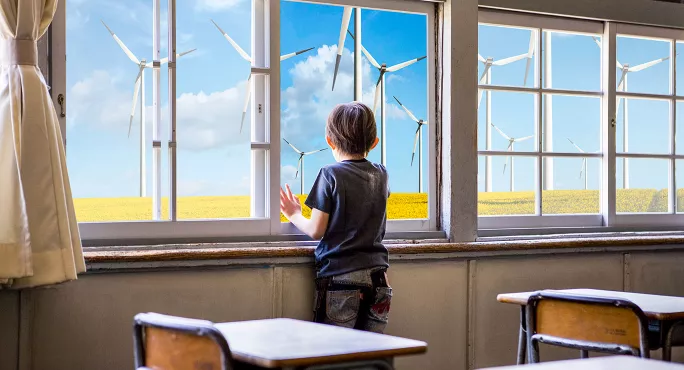‘Learning for sustainability’: 8 ways to hit targets

Sustainability is put “at the centre of the Scottish education system” by a new national plan, which includes the target that “every school and early learning setting will be sustainable by 2030”.
The Scottish government’s Learning for Sustainability (LfS) plan, titled Target 2030: A movement for people, planet and prosperity, includes 25 “actions” and follows nine months of work with pupils, teachers and other education staff.
The plan is at the forefront of Scottish education’s contribution to a wider national target on climate change and Scotland’s ambition to become a “net zero” nation by 2045.
Improving sustainability in Scottish education
Here is a flavour of what the plan says about improving sustainability in education:
1. Qualifications
The Scottish Qualifications Authority (SQA), along with Education Scotland, the Scottish Credit and Qualifications Framework (SCQF) and other organisations, has been told to “ensure LfS is visible and supported through all existing and new qualifications and pathways, including the development of new qualifications where required”.
The report notes that three new education bodies are due to be created - involving the replacement of the SQA and Education Scotland, in their current form at least - and promises an “update [from the Scottish government] on connections between LfS and education reform by December 2023”.
2. Leadership
Education Scotland will lead work “to ensure that LfS is better embedded in all relevant leadership programmes across the school, early learning and childcare, [Gaelic-medium education] and community learning sectors”.
3. Mentoring
The leadership work above will be “closely aligned and integrated” with a new “LfS mentor role”. An LfS “mentor network” for teachers and other educators will “encourage collaborative leadership, provide peer support and share approaches on embedding LfS in the curriculum”.
- Headteachers’ view: Sustainability should be part of all that schools do
- Interview: The primary school principal teacher who won an award for teaching about sustainability
- Related: How to make outdoor education part of the curriculum
4. Outdoor learning entitlement
A national working group, reporting to Scottish ministers, will “pursue a range of actions to ensure that all children receive entitlements to outdoor learning in all its forms”.
Meanwhile, NatureScot (the quango also known as Scottish Natural Heritage) will promote the use of the Nature Discovery Map Scotland - which aims to encourage schools to think of their grounds as “one whole ‘park’ with vast potential to help halt the decline of biodiversity” - and other resources that could encourage schools to use nearby green spaces.
5. Student teachers
Education Scotland and the Scottish Council of Deans of Education will establish a new national working group to drive a single national approach for supporting LfS in initial teacher education.
6. Inspection
When the How Good is Our School? framework is updated, inspectors will consider how LfS can be “better reflected” in it. Inspectors will also “consider the need for a national thematic inspection on LfS”.
7. National pupil group
An LfS leadership group for pupils across Scotland will be set up to ”ensure meaningful collaboration with learners” as the national sustainability plan to hit the 2030 targets is implemented.
8. “One-stop shop” for teachers and pupils
A new “portal” will be created to gather together examples of LfS in action and signpost to resources and professional learning opportunities.
Launching the Learning for Sustainability plan at Dundee’s Grove Academy last month, education secretary Jenny Gilruth said: “Perhaps more than any other group, our children and young people recognise the importance of climate and social justice. I have heard from many of them that they are looking for bold initiatives to transform their learning environment - [the new plan] is designed to achieve just this.”
The SfL plan entails “placing sustainability at the heart of the education system” and “revolutionising what and how students learn”, added Ms Gilruth.
You need a Tes subscription to read this article
Subscribe now to read this article and get other subscriber-only content:
- Unlimited access to all Tes magazine content
- Exclusive subscriber-only stories
- Award-winning email newsletters
Already a subscriber? Log in
You need a subscription to read this article
Subscribe now to read this article and get other subscriber-only content, including:
- Unlimited access to all Tes magazine content
- Exclusive subscriber-only stories
- Award-winning email newsletters



